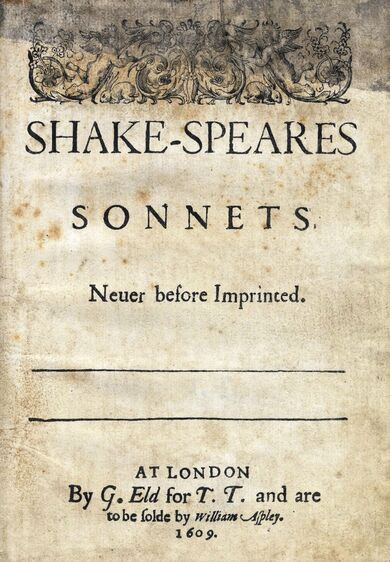Sonnet LV: Not marble, nor the gilded monuments
by Sophia Brookshire
William Shakespeare's "Sonnets 55" serves as a living record for the narrator's beloved, the young man. The two major themes in this poem are the passage of time and immortalization through the written word. The narrator states that his beloved will outlive the greatest monuments and the destruction of war to be welcomed into heaven upon Judgment Day. The young man becomes immortal thru the mere act of reading this sonnet; as long as people keep reading these words the young man will never die. It is the hope of every writer that their work will live on and be relevant 'til the end of time, and through their work they (the author) become immortal also.
The narrator begins the sonnet by saying that neither marble nor "gilded" (to overlay with or as if with a thin covering of gold) "monuments of princes" will "outlive this powerful rhyme." This is a bold statement for the narrator to make; he asserts that his writing is more valuable than even the most expensive royal artifacts. The phrase "powerful rhyme" also calls to mind the adage "the pen is mightier than the sword," which was coined by the English author Edward Bulwer-Lytton in 1839 in his play Richelieu; or the Conspiracy. The narrator then goes on to compare two things that really aren't comparable: the young man will shine more bright in these verses than an un-swept stone that is "besmeared with sluttish (slovenly) time;" or put in another way the young man will shine more brightly in these verses "than in a stone tomb or effigy that time wears away and covers with dust" (Greenblatt 1066). The young man is described as bright and the tomb is described as dark and dusty; so there is really no contest, the young man is automatically deemed more attractive.
The young man's life and beauty will never be forgotten. "Wasteful" (ruin/ pointless) wars will ruin beloved statues, and "broils" (battles) will lay waste to the mason's work, but the young man's memory will prevail. Mars is the Roman god of war, in the Roman tradition it was said that people died happily on his battlefield; while his Greek counterpart Ares, was said to be a ruthless and murderous god of war (Hamilton 34-5). Neither Mars, one of the greatest warriors of all time, nor fire will be able to erase these verses.
The young man will continue forth against death and all "oblivious" (the condition of being forgotten) "enmity" (ill-will). His beauty will continue to be praised in all posterity (future generations) until the "ending doom" (Judgment Day). In Christianity, Judgment Day follows the resurrection of the dead and the second coming of Christ, and it is when God judges all humans and decides if they are worthy to enter into heaven.
In the final couplet, the narrator declares that his beloved will enter into heaven upon Judgment Day, but until that day comes he will forever be alive in these verses and be loved by all who read them.


